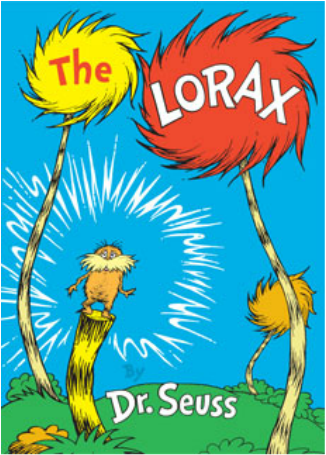 The Lorax warns that industrial activity will destroy our natural environment. The Lorax warns that industrial activity will destroy our natural environment. Tags: capitalism, consumption/consumerism, economic sociology, environment, theory, ethical consumption, externalities, industrial production, ipat formula, markets, 21 to 60 mins Year: 1972 Length: 25:13 Access: YouTube Summary: Written by Dr. Seuss, The Lorax is a children's book that tells the story of a stereotypical industrialist who clear-cuts a forest of trees to produce "Thneeds" for growing consumer markets. The Lorax, who "speaks for the trees," continuously but unsuccessfully explains that the industrial activity is destroying the forest and the homes of its many animals. The industrialist, Mr. Onceler, explains he is only "meeting consumer demand" and that "if I didn't, someone else would." But eventually, the trees are gone and the landscape is destroyed, thus making Mr. Onceler's business go bankrupt. Seeing the errors he made, Mr. Onceler encourages a boy passing by to plant new Truffula trees and regrow the forest. The original cartoon based on the book offers a familiar and entertaining way to discuss the relationship between industrial production, consumption, and environmental problems (note the cartoon was more recently made into a computer-animated film with 70+ controversial product-placements, offering additional points of discussion). The cartoon illustrates many key concepts, including the externalization of environmental costs, the consumer demand that partially drives the treadmill of production, and the popular IPAT forumla (Impact = Population X Affluence X Technology) for conceptualizing factors that explain environmental degradation. However, as Maniates (2001) argues in "Individualization: Plant a Tree, Buy a Bike, Save the World?," the story narrowly suggests individualistic solutions. He argues the proposed "response half-consciously understands environmental degradation as the product of individual shortcomings (the Once-ler's greed, for example), best countered by action that is staunchly individual and typically consumer-based (buy a tree and plant it)" (pp. 32-33). As such, the video can be used to distinguish the individualist explanations of production and consumption, from the more sociological explanations that link Mr. Onceler and the Lorax's activities to broader structural and institutional forces (and the limits of consumer-driven prospects for change). Maniates further notes that the popular IPAT formula excludes several important factors related to power and governance that impact environmental degradation. Another interesting theme, noted by Maniates (p. 32), is the "seeming inability of science (represented by the fact-spouting Lorax himself) and objective fact to slow the damage." Submitted By: Paul Dean
2 Comments
Manuel Franco
7/29/2023 01:41:48 am
I just want to say Thank You to everyone who supported me through the years. My name is Manuel Franco, New Berlin, Wisconsin. My story of how I won the Powerball lottery of $768.4M is a bit of a tale. I have been playing Powerball tickets for 6 years now since I turned 18. I bought my first ticket on my 18 birthday. I was feeling very lucky that day because I had contacted Dr. Odunga Michael to help me with the winning Powerball numbers. I really had that great great feeling that I looked at the camera wanting to wink at it. I only did a tiny part of it and trusted him. He gave me the numbers after I played a couple other tickets along with it for $10. I checked my ticket after the winnings came online and saw the numbers were correct including the Power play. I screamed for about 10 minutes because it felt like a dream. I had won $768.4M. You can check my winning testimony with the lottery officials just with my name search. Thank you Dr Odunga. Well, his email is [email protected] and you can also call or Whats-app him at +2348167159012 so you guys can contact him
Reply
mark hold
7/7/2024 01:54:51 pm
One faithful day as i was watching a video on you tube i saw a comment of one MR PAUL HAVERSACK testifying of this great herbal healer doctor Moses Buba,That helped him enlarge his manhood .i was shocked and happy, so i quickly visited his website and emailed him within 30 mins he got back to me and told me all i need to buy and i did so after 4 days i received his herbal medicine ,he gave me instructions on how to use it ,as i am speaking to you people now after using the cream for just two weeks my manhood size is 10 inches long and 8.0 girth ,,am so happy and grateful for his work in my life thank you so much Doctor Moses buba ,,i also learnt he has cure for LOW SPERM COUNT,PREMATURE EJACULATION,ERECTILE DYSFUNCTION,HIV/AIDS VIRUS,DIABETES 1/2,HERPES DISEASE,CANCER,and lots more
Reply
Leave a Reply. |
Tags
All
.
Got any videos?
Are you finding useful videos for your classes? Do you have good videos you use in your own classes? Please consider submitting your videos here and helping us build our database!
|
 RSS Feed
RSS Feed
